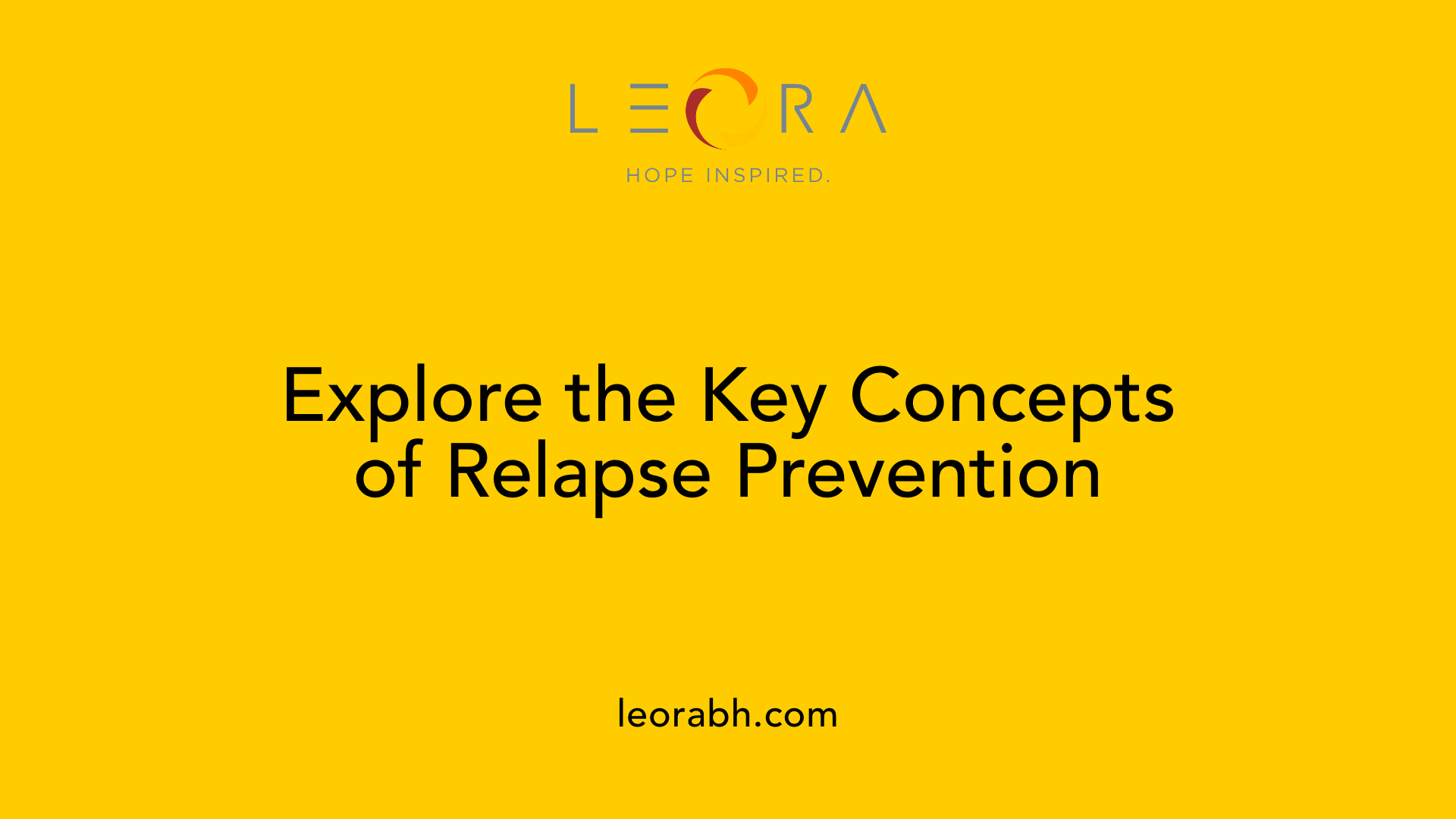Creating a Relapse Prevention Plan
Mastering Relapse Prevention for Lasting Recovery
Introduction to Relapse Prevention
Relapse prevention is a critical component of recovery from substance use disorders. Creating an effective relapse prevention plan involves more than just abstaining from substances; it requires a strategic and proactive approach to managing cravings, identifying triggers, and employing coping strategies to maintain sobriety. This article explores essential elements for developing a personalized relapse prevention plan, offering step-by-step guidance to support individuals in their recovery journey.
Understanding the Foundations of Relapse Prevention

What is Relapse Prevention?
Relapse prevention is a proactive strategy designed to aid individuals in recovery from substance use disorders by outlining methods to manage cravings and triggers. This plan helps individuals develop coping mechanisms that are tailored to their specific needs, allowing them to navigate stress effectively and maintain their commitment to recovery.
Why is a Relapse Prevention Plan Important?
A relapse prevention plan serves as a vital tool in the recovery process. It acknowledges that relapse is not merely an isolated event, but rather a process that unfolds over time, involving emotional, mental, and physical components. By recognizing the potential for relapse early, individuals can implement their plans to avoid setbacks, thereby enhancing their chances of sustained recovery.
What Are Common Strategies in a Relapse Prevention Plan?
A comprehensive relapse prevention plan should include various tactics aimed at addressing triggers and managing cravings. Some common strategies involve:
- Identifying Triggers: Recognizing situations, people, and emotions that can lead to substance use.
- Self-Care Techniques: Engaging in activities like exercise, mindfulness, and healthy eating to maintain overall well-being.
- Support Systems: Building a network of family, friends, and support groups that encourage accountability and foster a healthy recovery environment.
- Goal Setting: Establishing realistic short-term and long-term goals to maintain focus on recovery.
- Coping Skills: Developing strategies to manage cravings effectively, such as engaging in hobbies or leaning on support contacts for help.
What Are the Stages Involved in a Relapse Prevention Plan?
A relapse prevention plan involves several stages to help individuals maintain sobriety and manage triggers associated with substance use. The Gorski-Cenaps Relapse Prevention Model outlines a 9-step process that includes stabilization, assessment, relapse education, identifying warning signs, managing warning signs, recovery planning, inventory training, family involvement, and follow-up. Relapse typically progresses through three stages: emotional relapse, where individuals exhibit behaviors indicating stress or emotional turmoil; mental relapse, where thoughts about using substances begin to emerge; and physical relapse, which involves actually using the substance again. Key strategies in a relapse prevention plan include recognizing early warning signs, such as emotional bottling and isolation, and developing coping mechanisms to manage stress and triggers effectively. Ultimately, immediate support and a solid recovery network are crucial to assist individuals in staying on track if a relapse occurs.
Essential Components of a Relapse Prevention Plan

What components should be included in a relapse prevention plan?
A comprehensive relapse prevention plan must be tailored to address the unique needs and triggers of each individual. Key components include:
Identifying Triggers: Recognizing specific external and internal triggers is vital. These may encompass stressful situations, certain emotions (like boredom or anger), and people or places that remind one of past substance use.
Managing Cravings: Developing effective techniques to cope with cravings is essential. Strategies might include engaging in distractions, connecting with supportive friends or sponsors, and practicing mindfulness to maintain focus on recovery.
Coping Skills Development: Building a toolkit of healthy coping skills is critical. This may involve regular exercise, journaling, or relaxation techniques like meditation, all contributing to overall emotional well-being.
Support Systems: Establishing a solid support network strengthens recovery efforts. This should include regular attendance at support group meetings, and maintaining close contact with encouraging friends and family members.
In addition to these components, documenting the reasons for sobriety and recognizing feelings that may lead to relapse enriches personal accountability. Furthermore, the plan should be seen as a living document, requiring regular updates to reflect progress and changes in circumstances during recovery.
The Five Rules of Relapse Prevention

What are the five rules of relapse prevention?
The five rules of relapse prevention serve as essential guidelines for individuals in recovery to help them maintain progress and avoid relapse. Here’s a closer look at each rule:
Change Your Life
This involves implementing significant lifestyle changes that support recovery, such as altering social circles and routines that may pose risks.Be Completely Honest
Honesty with oneself and others about feelings, behaviors, and challenges faced during recovery is crucial for self-awareness and accountability.Ask for Help
Reaching out for support from friends, family, or mental health professionals when struggling is a vital step in maintaining recovery.Practice Self-Care
Prioritizing physical and mental well-being through activities such as exercise, healthy eating, and relaxation techniques strengthens resilience against relapse.Don’t Bend the Rules
Adhering strictly to the principles of recovery and commitments made during the process ensures a consistent approach to overcoming challenges.
How to implement these rules effectively in recovery?
Implementing these rules requires intentionality. Individuals can start by setting specific, attainable goals focused on lifestyle changes that reinforce recovery. It might also be beneficial to establish an honest dialogue with trusted people about fears and setbacks.
Creating a support network is critical—ensuring that those around you understand the journey and are willing to assist during difficult times. Regular self-care practices such as mindfulness, exercise, and healthy eating can foster a balanced approach to physical and emotional well-being.
Lastly, having a written plan that outlines these rules can serve as a constant reminder to stay committed to the recovery process and resist any temptations to alter the structured approach that works. Being proactive in recognizing early signs of emotional and mental distress can enhance the overall effectiveness of these rules in preventing relapse.
Creating Your Personalized Relapse Prevention Plan
How do you create a personalized relapse prevention plan?
Creating a personalized relapse prevention plan begins with identifying your personal goals and motivations for maintaining sobriety. Clearly outlining these objectives, such as improving relationships or achieving fitness goals, adds a strong purpose to your recovery journey.
Next, develop a management plan that details how you will cope with cravings and triggers. This might involve incorporating healthy lifestyle practices, such as regular exercise, proper nutrition, and adequate sleep, which are crucial for mental and physical well-being. In addition, improving self-care routines can further safeguard against potential pitfalls that lead to relapse.
You should also prepare communication tools to reach out for support during challenging times. This includes identifying individuals in your support system, such as family, friends, or fellow members of self-help groups like Alcoholics Anonymous (AA). Establishing a reliable support network is essential in navigating stressors and triggers effectively.
Finally, implement accountability strategies that help you stay focused on your plan. Regular check-ins with a therapist or support group can provide the encouragement needed to maintain commitment towards recovery. By integrating these components, you will have a robust and comprehensive relapse prevention plan that enhances your chances of achieving lasting sobriety.
What are the benefits of personalizing your plan?
Personalizing your relapse prevention plan offers significant benefits. It allows for tailored coping strategies based on your unique circumstances and triggers, ensuring that the tools you use are effective. This customization can enhance self-awareness, helping you identify emotional and situational patterns that lead to cravings. Additionally, a personalized plan fosters a sense of ownership over your recovery, increasing motivation and accountability.
How does involving support systems help?
Involving your support system is crucial in crafting an effective relapse prevention plan. Family members and friends can provide emotional support and practical assistance in identifying triggers and managing stressors. Engaging with a community, like self-help groups, exposes you to shared experiences and coping strategies from others who understand your journey. This collective involvement creates a safety net that reinforces commitment to sobriety, ultimately enhancing chances for successful recovery.
Identifying and Managing Triggers

What are common triggers for relapse and how can they be managed?
Triggers for relapse can be categorized into internal and external stimuli. Internal triggers often include emotional states such as depression, anxiety, and stress, while external triggers may involve specific physical environments, social gatherings, or the presence of certain individuals associated with past substance use.
Effectively managing these triggers begins with identification. Individuals in recovery must recognize which situations, emotions, and people might lead them back to substance use. Once identified, they can implement healthy coping strategies to counteract these triggers.
Coping strategies
Some effective coping strategies include:
- Mindfulness techniques: Practicing mindfulness, such as meditation or deep breathing, can significantly reduce cravings and improve emotional regulation.
- Healthy distractions: Engaging in activities like exercise, journaling, or hobbies can divert attention away from cravings and emotional distress.
- Building cognitive skills: Techniques like cognitive-behavioral therapy (CBT) help modify negative thought patterns that contribute to stress and cravings.
Role of mindfulness in managing triggers
Mindfulness plays a crucial role in managing both internal and external triggers. It enhances self-awareness, allowing individuals to observe their thoughts and feelings without judgment. This awareness can lead to better responses to cravings and potential stressors, ultimately empowering individuals to maintain their sobriety effectively.
The Role of Support Systems in Relapse Prevention

Why are support systems critical in relapse prevention?
Support systems play an essential role in relapse prevention by providing emotional and practical assistance to individuals during recovery. Engaging family members, friends, and peers in support groups creates a network that fosters accountability and encourages positive change.
Building a support network
Establishing a solid support network involves reaching out to loved ones and participating in community groups. This network helps reinforce the commitment to sobriety. Regular check-ins with supportive contacts can aid in navigating high-stress situations and recognizing early warning signs of relapse.
Family and peer involvement
Family and peers significantly influence recovery outcomes. Their involvement can provide a sense of belonging and reduce isolation. Including them in the relapse prevention plan ensures that they understand potential triggers and can offer guidance and support when needed.
How support systems reinforce recovery
Consistent communication and regular engagement with support networks enhance motivation and dedication. Individuals who share their goals and struggles with these supportive relationships are more likely to stay focused on their recovery journey. By fostering an environment of accountability, support systems empower individuals to make healthier choices and sustain their recovery over time.
Additional Considerations
Effective support systems not only provide encouragement but also enable individuals to practice healthy coping skills together, emphasizing the importance of mutual support in the recovery process.
Integrating Healthy Lifestyle Changes
Role of lifestyle habits in recovery
Healthy lifestyle changes play a pivotal role in recovery from substance use. They foster a balanced life, create stable routines, and reduce reliance on substances by improving both physical and mental health. Elements like nutritious eating, consistent physical activity, and adequate sleep are essential components that support overall well-being.
Implementing healthy routines
Establishing healthy daily routines can greatly enhance recovery outcomes. Strategies include:
- Exercise: Engaging in regular physical activity, such as walking, jogging, or yoga, to boost endorphins—our body's natural mood lifters.
- Nutrition: Eating a balanced diet helps regulate mood and energy levels, making it easier to manage cravings.
- Adequate Sleep: Prioritizing quality rest is crucial as it directly impacts emotional regulation and cognitive functions.
Benefits of self-care
Incorporating self-care techniques is beneficial for emotional stability. Activities such as meditation, deep breathing, and hobbies can help individuals cope with stress and promote mindfulness. This enhances emotional regulation, making it easier to manage the ups and downs of recovery.
How do healthy lifestyle changes support long-term sobriety?
Adopting healthy lifestyle changes is crucial for supporting long-term sobriety, as they help individuals manage stress and maintain a balanced life. Elements such as a nutritious diet, regular physical activity, and adequate sleep contribute to improved physical and mental well-being. Practicing self-care through yoga, meditation, or other relaxation techniques helps to regulate emotions and reduce anxiety. Encouraging hobbies and meaningful activities can enhance quality of life, thus reducing reliance on substances.
The Importance of Monitoring and Accountability
Tracking Progress
Monitoring progress is an essential component of any relapse prevention plan. Keeping track of both successes and setbacks can help individuals understand their recovery journey better. By recording daily experiences and feelings, they can identify patterns that may signify potential triggers or areas for improvement. Journaling or using mobile applications designed for tracking recovery can make this process easier and more reflective.
Periodic Assessments
Regular assessments are crucial for evaluating the effectiveness of a relapse prevention strategy. These assessments can be conducted weekly or monthly, providing individuals an opportunity to reassess goals and coping mechanisms. Through this reflection, they can determine if their needs have changed and if adjustments to the plan are necessary. This proactive approach allows for timely interventions, keeping the individual engaged in their recovery.
Role of Accountability Partners
Having an accountability partner, such as a recovery coach, therapist, or supportive friend, plays a significant role in monitoring one's commitment to their relapse prevention plan. These partners can offer constructive feedback, encouragement, and reminders of the individual's goals, helping mitigate the risk of relapse. Regular check-ins can also prompt meaningful conversations about challenges faced and strategies that need adjustment, reinforcing the importance of community in the recovery process.
| Key Aspect | Description | Tools/Techniques |
|---|---|---|
| Tracking Progress | Keeping a record of daily experiences | Journaling, mobile apps |
| Periodic Assessments | Regularly reviewing the effectiveness | Weekly/monthly evaluations |
| Accountability Partners | Support from trusted individuals | Recovery coaches, therapy sessions |
Adapting the Relapse Prevention Plan Over Time
Plan as a living document
A relapse prevention plan is not a one-time creation but rather a living document that reflects the ongoing journey of recovery. It should be regularly reviewed and modified to address changes in an individual’s life, emotional health, and recovery progress. Just as recovery is not static, the plan must evolve to remain effective in meeting specific needs.
Adjusting based on progress and setbacks
As individuals progress in their recovery or encounter setbacks, it's vital to adjust their relapse prevention strategies accordingly. Successful milestones might inspire new goals, while relapses can highlight areas that require more robust coping mechanisms. Regular check-ins with the plan help in fine-tuning strategies that resonate with an individual’s experiences and challenges.
Incorporating feedback from therapy
Therapeutic input is essential when adapting a relapse prevention plan. Incorporating insights from therapy sessions allows for a more personalized approach, ensuring that strategies align with the individual’s emotional and psychological needs. Open communication with therapists helps in identifying potential triggers, refining coping skills, and enhancing the overall effectiveness of the prevention plan.
By treating the relapse prevention plan as an adaptable framework, individuals can enhance their recovery journey, boosting their resilience to future challenges.
Conclusion: A Roadmap for Lasting Sobriety
A relapse prevention plan serves as a personalized roadmap to navigate the challenges of addiction recovery, equipping individuals with the tools needed to identify and manage triggers, strengthen support systems, and cultivate sustainable sobriety. As a living document, it requires continuous review and adaptation to meet the evolving needs of the individual. By adhering to foundational rules and actively engaging in lifestyle changes, individuals can significantly enhance their likelihood of achieving long-term recovery success.
References
- How to Write a Bulletproof Relapse Prevention Plan - River Oaks
- [PDF] Relapse Prevention Plan
- How to Create a Successful Relapse Prevention Plan
- Addiction Relapse Prevention - StatPearls - NCBI Bookshelf
- Relapse Prevention Plans - CSG Justice Center
- 3 Examples of a Relapse Prevention Plan | Addiction Treatment
- What is a Relapse Prevention Plan? - Verywell Mind
- How to Create a Relapse Prevention Plan
- [PDF] Relapse Prevention Plan
- How To Create a Relapse Prevention Plan (Downloadable Example)
Find Your Inner Light
Related Articles
Contact Us
Leora Behavioral Health offers a comprehensive addiction treatment programs to help you get your life back on track.
Our trained professionals will work with you to develop a personalized treatment plan that meets your unique needs. If you or someone you know is struggling with addiction, reach out to Leora Behavioral Health today.


.svg)





.svg)
.svg)
.svg)
.svg)